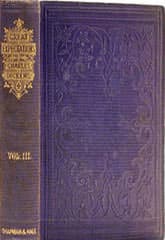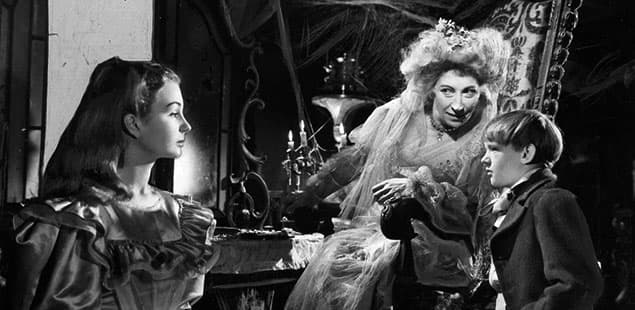Great Expectations
Critique • Other views • Quotes • Text • At the movies
 First edition
First editionFirst publication
1860–1861, serial in All the Year Round periodical
First book publication
1861 in three volumes
Literature form
Novel
Genres
Literary, Gothic romance
Writing language
English
Author's country
England
Length
Approx. 189,000 words

Miss Havisham (Martita Hunt) manipulates young Estella (Jean Simmons) and Pip (Tony Wager).
Pip's dashed hopes never disappoint
Great Expectations (1946): Film, 118 minutes; director David Lean; writers Anthony Havelock-Allan, David Lean, three others; featuring John Mills, Alec Guinness, Valerie Hobson, Jean Simmons, Tony Wager, Finlay Currie
It says something about the basic story line of Great Expectations that no matter how many film adaptations are made (over a dozen so far), they are always engrossing. Each time I come across a new one I start off thinking, "Ho-hum, here we go again," and then find myself caught up in it—looking forward to the latest rendition of each of the well-known scenes: Pip meeting the convict in the graveyard, his first visit to Miss Havisham's, his unrequited courtship of Estella, his discovery of the truth about his benefactor....
They say mediocre books make the best films. Either Dickens is the most mediocre writer who ever lived or Great Expectations is an exception to this rule.
For years the best adaptation of Great Expectations was considered the David Lean-directed 1940s cinematic version in black and white. But more recently a television mini-series has set a new standard. But let's go through some of the more noteworthy versions in rough chronological order.
Lean expectations
The 1946 film of Great Expectations is beloved for some very good reasons. For one thing it stars the likable duo of John Mills and Alec Guinness as respectively Pip and his roommate Herbert Pocket. For another it tells the essential story in under two hours. And the ending is sunnier (both metaphorically and quite literally) than the one Dickens wrote. In every aspect this is a brilliantly made movie for its time. The camera angles, the dialogue, the acting, the staging—they all work to dramatize the Dickens story.
Most especially it's a triumph of condensing genius. It is truly amazing how much of the Dickens novel is compacted into its short timeframe, and yet the film never seems rushed. The main characters are fleshed out and memorable. The story seems to be told in its own time. It is only if you compare pages of the text—or scenes of some of the later, longer films—to this production that you notice the cuts and the combination of scenes that have been combined.
Estella's early nastiness to a seemingly much younger Pip in 1946's Great Expectations.
This compactness works to exaggerate Dickens's already exaggerated sensibility a little further. The hunt for the convicts on the moors is more thrilling, Miss Havisham's home is spookier and more decrepit—as is Miss Havisham herself (Martita Hunt)—and Magwitch (veteran character actor Finlay Currie, who won the greatest acclaim of his career for this role) is larger than life as both villain and reformed criminal. The climax is a realistic and exciting river chase scene involving a packet-steamer, more or less as Dickens described it in the novel.
One complaint however is that the character of Orlick—Pip's persecutor and his sister's murderer—is eliminated, which makes Mrs. Joe's sister's sudden demise seem arbitrary. It's announced in a voice-over that she got sick and died. Also the role of Pip's confidante Biddy is greatly reduced.
I have a further gripe about the character of Estella. Her younger version is played by British actress Jean Simmons, who would soon become a major Hollywood star and who is perfect as the beautiful, cruel, and cruelly used girl. But when Estella reaches adulthood, Simmons is replaced by Valerie Hobson (wife of the film's producer). Hobson is elegant and stately but she's no Estella and our fascination in the character is dissipated. I can't help but think Simmons, who at sixteen was playing younger than her age for the early Estella, could have made the transition herself into a great grownup Estella, the icy belle of London.
(More than four decades later Simmons would make a great Miss Havisham in a television miniseries.)
Lean's Great Expectations is often named among the best black-and-white films o the twentieth century and one of Britain's top ten films ever. The great respect won by this this adaptation is shown by the fact that subsequent versions often copied its staging for crucial scenes and used many of the same special effects. Some of the dialogue created for the 1946 film also shows up verbatim in later adaptations.
But, be all that as it may, for Dickens readers this cannot be considered the best adaptation of the novel, if only for the fact that it's way too short to accommodate that entire sprawling story.
— Eric
Critique • Other views • Quotes • Text • At the movies

